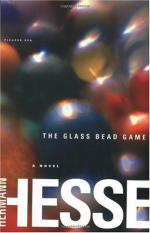|
This section contains 3,715 words (approx. 13 pages at 300 words per page) |

|
SOURCE: Gotz, Ignacio L. “Platonic Parallels in Hesses's Das Glasperlenspiel.” German Quarterly 51, no. 4 (November 1978): 511-19.
In the following essay, Gotz explores the similarities between Das Glasperlenspiel and Plato's ideas, especially the Republic.
Like all Western literature, Das Glasperlenspiel is in a sense “a series of footnotes to Plato.”1 I do not mean this as detraction. But the fact is that the wealth of insights expounded in the Platonic corpus renders it, to quote Whitehead once more, “an inexhaustible source of suggestion.”
Hesse's Das Glasperlenspiel forces us to confront the problems of the one and the many, permanence and flux, twenty-four hundred years after their formulation by Plato. And lest the connection with Plato's formulation be missed, Hesse clearly places the action of the novel in the year 2400 A.D. Indeed, by the very structure of the novel with its recurring cycles of lives, Hesse also wants to convey...
|
This section contains 3,715 words (approx. 13 pages at 300 words per page) |

|


